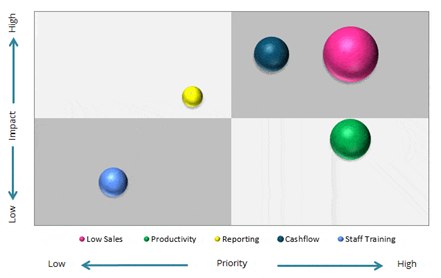Haven’t Evaluated Your Business in 2020 Yet? Here’s Why You Should

Though this might seem like common sense to some, some business owners are surprised to find out that they need to regularly evaluate their business, AKA do a business “check-up”. This is necessary for the health of the business, and to keep its progress going in the right direction.
This is an often overlooked task, as business owners tend to spend more time actually working in the business.
Business evaluations aren’t a heavily discussed topic, so it’s no surprise that some SMEs don’t realize they need to occasionally look at their business from an objective perspective.
With how business is conducted always changing and updating it’s necessary to make sure your business keeps up. Check out the top reasons why, below.
1. Evaluations are like a pre-emptive strike against future risks and problems
Yes, it’s that serious. Evaluating your business is essentially like launching concentrated efforts at “enemies” (risks/issues) that are lying in wait. By discovering where these issues may pop up before they actually do, you’re able to strike first, and avoid them altogether.
Don’t think you have any hidden issues to worry about? Say that to the 60% of businesses that are profitable before they fail. Just because things seem fine, doesn’t mean they are.
The sad part is that these businesses aren’t collapsing due to some large event that suddenly occurred, but because of small mistakes made over time.
So, you may think you’re doing well… but you can’t know for sure. It’s much better to evaluate your business now and find everything is okay, then to risk it and lose everything.
2. You’re not omnipotent
Did your grade school teachers ever make you read your own work aloud to check for mistakes? They do this because it’s very hard to see our own mistakes, unless viewed from a different perspective.
The same is true for your business. And the more experienced you are in your field, the more you’re likely to feel safe that you’re not making mistakes.
Sometimes you just need an impartial viewer to take a look at your business. You may not see mistakes you’re making, but they will.
3. You don’t know what you don’t know.
During my time as a business advisor, I heard some interesting stories from business owners.
I was speaking to a café owner one day, when I asked. “what does a coffee cost you to make?” To my surprise, the business owner had no idea. I then asked, “what does your cost structure look like? I.e. What percentage of your expenses are: Rent, utilities, food and wages?”
Once again, the business owner had no idea.
I then politely asked, do you know how you benchmark against industry averages? The response to this was a blank face.
This example clearly illustrates how many business owners are operating blindly, and that is exactly why it’s essential that you know all there is to know about your business.
4. Understand the key aspects of your business
A thorough examination of the below key aspects will help you to make more informed decisions and reduce risks.
Business Strategy
- Business Strategy Plan
- Cost Reduction
- Compliance and Risk
- Legal
- Process Improvement
- Competitor Analysis
- Benchmarking
- New Product / Service Development
Marketing
- Marketing Strategy
- Branding
- Website
- SEO
- Digital Marketing
- Email Marketing
- Social Media
- Lead Generation
Sales
- Business Development / Sales Strategy
- Customer Relationship Management (CRM)
- Quoting
- Tendering
- Pricing
Customer Service
- Customer Service Policies
- Measure and Analysis
Human Resource
- Recruitment
- Training and Development
- Employee Incentives and KPI’s
- Workplace Culture
Leadership & Wellbeing
- Time Management
- Wellbeing
- Leadership and Direction
Accounting & Finance
- Bookkeeping
- Tax Compliance
- Payroll Administration
- Financial and Cash Flow Forecasting
- Financial Goals
- Budget Management
- Financial Policies and Procedures
- Financial Performance
Operations
- Operation Management
- Administration
Technology
- Productivity
- Cloud and Infrastructure
- Cyber Security
5. Time is money. And so are resources. And so is your actual money...
Your time, resources, and money don’t grow on trees. So you likely don’t have enough to check off all your goals on your list.
If you want to use these resources effectively, you have to figure out which tasks are the most vital to your business’s health. But to do so you need to evaluate your business to understand which tasks will have the most positive impact.
Just take a look at venture capital and private equity firms. When looking into an industry, they determine what its 3-5 must wins are, so they can focus on the key things that will propel the business forward. This narrows down the focus onto activities that will create the best results with the least amount of resources used.
The takeaway from this is that after evaluating your business, you can comfortably and knowledgeably choose which areas to focus your resources on and stop wasting resources on those that hold no value.
The below chart demonstrates pain points within this business. The initiatives that are the most impactful are evident based on Impact and Priority. Use business tools like the chart below, to help you develop and grow your business.

6. Don’t move forward blindly; use your evaluation to plan your business strategy
Business planning and strategy tend to fall to the wayside for businesses with limited resources.
But evaluating your business, as pointed out in the above point, allows you to allocate your time more efficiently, as well as pointing out which areas you need to focus on. This means you should be able to easily create a business strategy that lets you focus on specific tasks that should be done over set periods of time.
This allows team members to work solely on the tasks that drive your company’s goals forward and increase profitability.
Following an evaluation, business owners typically break these tasks into:
- 100-day Plan
- 6-month Target
- 12-month Target
- 18-month Target
Additionally, this plan could benefit from monthly reporting and the adjustment of KPI’s.
7. Help your team and advisors to learn more, at a faster pace
A steep learning curve is something we all aspire to; who doesn’t want to be able to learn a lot in a short amount of time, allowing them to make better informed decisions?
You’re not just benefitting yourself and team by evaluating your business. Your business advisor also gains this high learning curve, allowing them to provide you with the best possible service they can give.
It should come as no surprise that the more your advisor knows about your business, the better they can advise you. This is why it’s so essential for your advisor to be told everything; missing important pieces of information just hurts your business.
Evaluating your business before deciding to work with a business advisor helps them to get the ball rolling quickly. You’re working with them because you want to scale, so give them all the crucial tools that will give them a head start.
If you choose not to evaluate your business, they’ll end up working on tasks that don’t really matter, because they aren’t getting the whole picture. With an evaluation they’ll be able to quickly decide which tasks propel growth and enhance sales.
Recap
Every business can benefit from an evaluation, which allows them to find opportunities for growth and sustainability.
You’ll also be able to avoid making mistakes, and choose which tasks need more or less resources.
Business evaluations allow you to see your business holistically, so you can analyze key areas and condense them into one document.



